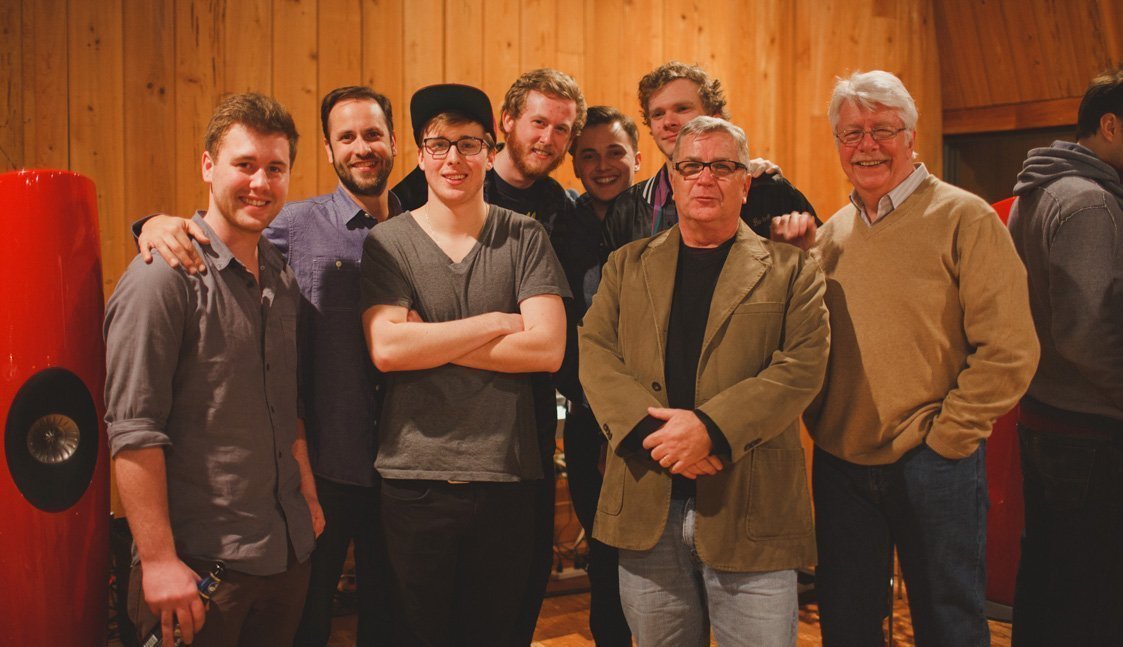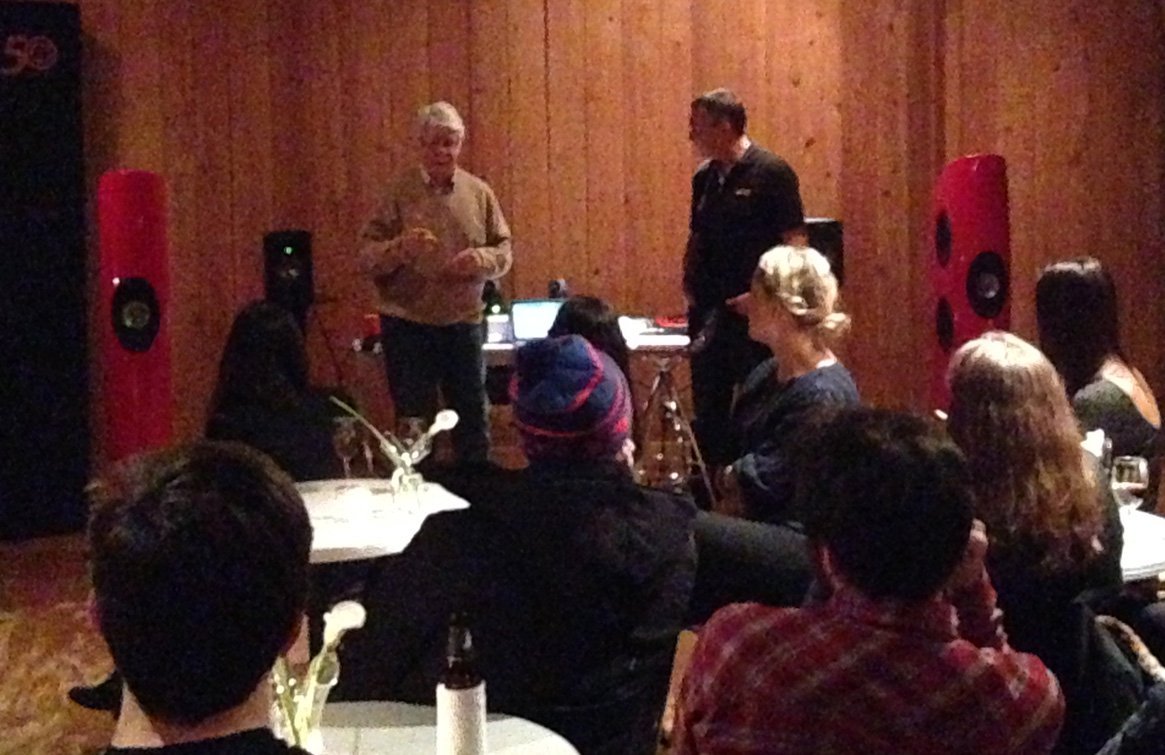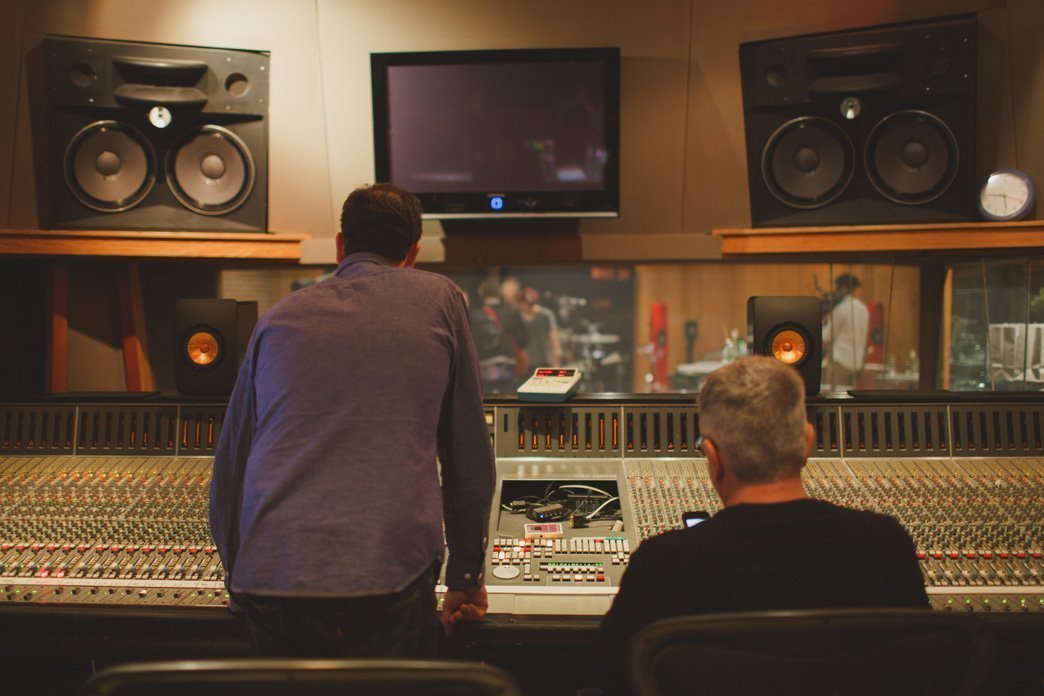
On a snowy Thursday night in midtown Manhattan, KEF Audio gave a wonderful demonstration of their loudspeaker and headphone technology at the beautiful MSR Studios. The event was actually far more than just a demonstration. It was a full-fledged recording session featuring the legendary sound engineer & record producer Ken Scott, and an up-and-coming rock band from Nashville called Staying For The Weekend.
Ken Scott's illustrious career began at EMI Studios in London (before it was known as Abbey Road), where he worked his way up to become recording and mixing engineer on many recordings by The Beatles. Scott has gone on to engineer and produce some of the most important records in rock and jazz music history. He's just recently moved from Los Angeles to Nashville, and in 2012 he published a book called Abbey Road to Ziggy Stardust: Off-the-record with The Beatles, Bowie, Elton, and so much more.
The evening began with KEF's Johan Coorg introducing the company's line of products and giving a nice introduction to Ken Scott. The products on display were the KEF Blade speakers, the KEF LS50 studio grade monitors, the KEF X300A Digital Hi-Fi speakers, and the KEF M500 headphones. Mr. Coorg told the crowd that he didn't want to bore us with technical details and specifications; he wanted us to listen to the products for ourselves and enjoy the music.
From there, Ken Scott took over with a discussion that started by declaring himself as "The GOM" - short for "The Grumpy Old Man" - because he's become so unhappy with how the world of music has changed over the years. While he's grumpy about some things, it must be said that he is a very warmhearted and genuine man with incredible insight and experiences.
Mr. Scott fondly recalled when John Lennon inspired the technical wizards at EMI Studios to invent a device that could get the same effect that was produced when two nearly identical vocal tracks were mixed together, a signature sound that can be found on many Beatles recordings. John named the new device a Flanger, and since then it's been used as a psychedelic effect by countless recording engineers and guitar players. This was the good side of technology, when creative people came together and produced something beautiful as an extension of the human spirit.
The next anecdote was about the bad side of technology, and specifically Auto-Tune. Scott railed against how popular singers today that used Auto-Tune are just like athletes who use performance enhancing drugs or Milli Vanilli, who were awarded Grammys and then had to give the awards back because it was discovered that they didn't sing on their own records and were actually lip-syncing in concert.
Scott played an isolated vocal track of David Bowie's "5 Years," the first song on the masterpiece album The Rise and Fall of Ziggy Stardust and the Spiders from Mars. He recalled being in the studio and seeing tears streaming down Bowie's face by the end of the performance. Afterward, everyone in the room had been clearly moved by what they just heard. It was a real privilege to hear such a rare track on the beautiful KEF Blade speakers. When it was done playing, Scott explained in disgust that these days a major record label would reject the mix of the song and ask for it to be Auto-Tuned.
Ken Scott worked closely with Bowie for many years, starting as a sound engineer and eventually becoming a co-producer. He shared an incredible fact: "95% of the vocals you hear on David Bowie albums were recorded on the first take, without any need for corrections." That raw imperfect quality is something that makes the recordings so beautiful and pleasurable to listen to. Bowie may not always be perfectly in pitch, but it actually sounds better than the lifeless Auto-Tune music you hear on Top 40 radio today.

Next up was a very cool demonstration on the sonic differences between a vinyl record and a compact disc. Ken Scott had the 40th anniversary edition of Ziggy Stardust, and played "Suffragette City" several times so we could hear the difference between the vinyl and the CD. First, he played the CD version. It sounded good. Then he played the vinyl, and I was blown away. Instantly, you could hear that the low end drum and bass sounded much bigger and warmer, and the high frequencies sounded more clean and open.
Scott shared his feelings about why he loves the experience of listening to an album side. Dropping the needle on a record and holding a 12" x 12" album cover with beautiful graphics and interesting information were part of how music was consumed for decades, and it's encouraging that vinyl record sales have been climbing recently. A recent report by Nielsen showed that vinyl sales were up more than 30% in 2013 compared to 2012.
This led Scott to one of the most fascinating things that came up all evening. One night while he was in the supermarket, Scott heard a song that he had worked on. Scott explained, "When we were in the studio making this music, we were fighting The Man. Now it's all part of The Man."
During the '60s and '70s, Rock and Roll was a revolutionary art form that was part of a social and cultural movement. Now, it's just another commodity and an accepted part of the background. On one hand, those artists from the '60s and '70s have won that fight, since they are now the accepted leaders of popular culture and they've opened things up for personal freedom and higher consciousness on a massive scale. On the other hand, when that music becomes part of the background, it loses the impact and excitement that it had as the primary focal point it was made to be.
The idea that music should be more than just background noise went perfectly with this demonstration of the KEF speakers and headphones. Hardware like MP3 players, smart-phones, and laptops have changed the way that people listen to music. It's easier than ever to find and play music, but the quality of playback for the average consumer is arguably worse than it has ever been.
Mr. Coorg expressed his frustration that people pay thousands of dollars for a new computer, but then listen to music through cheap speakers and headphones they buy as an afterthought. Passionate music lovers owe it to themselves to buy high quality components to enjoy the music on a higher level. To prove his point, he demonstrated a side-by-side shootout comparison between the Blade speakers, the KEF X300 Digital Hi-Fi Speakers, a cheap pair of Logitech speakers, and an Apple laptop's built in speakers.
The Blade speakers are made for the highest end audiophile consumer. The sticker price at KEF's website is $29,999 and that doesn't include the necessary amplifier to power them. They sound beautiful, they look beautiful, and they cost as much as a nice car.
Next up, the KEF X300 speakers were very impressive. They've been designed with built in digital-to-analog converters and amplifiers, so they plug directly into a computer or smartphone with a USB cable. They also have a wireless version, for the ultimate ease of use. Compared to the Logitech speakers, the X300 were noticeably more detailed and crisp. The built-in laptop speakers were absolutely awful to listen to, with hardly any low-end so the bass line completely disappeared.
After the demonstrations, it was time for the recording session. In the studio's control room, a pair of KEF LS50 speakers were set up. These have been designed for music professionals who want great sound for a reasonable price. They feature exceptional audio components, and they produce a big sound with great low end response considering their small and sleek construction.
Staying For The Weekend recorded two songs, "Gold" and "Tongue In Cheek" - both in just 1 take. They had set-up and recorded two other songs earlier in the day, so the process was very quick and painless. The band is composed of 5 young men who met at Belmont University in Nashville. Their name comes from the Kings of Leon song, "King of the Rodeo," and the influence certainly comes through in their music. It was striking how professional and confident they were on their first trip to New York City, and I'd say they are definitely a band to look out for in the near future.

Things wrapped up with a Q&A session and general schmoozing around the studio.
One last piece of wisdom from Ken Scott stuck with me: The Beatles changed everything in the '60s. Before them, music was mainly consumed in singles, and most popular acts were singers manufactured by record labels who provided them songs, wardrobes, musicians, etc. The Beatles were self-made musicians who wrote their own songs and mastered their craft on their own terms. Beatles albums were so good that the album became the standard way to consume music, and other artists followed their lead in making incredible long-form recordings that were deeper and more elaborate than anything that had previously existed. When iTunes and YouTube became the new standard for digital music consumption in this new millennium, the single was once again the common denominator for music consumption. In order for things to change again, Scott said, it will take artists with talent that can transcend and inspire consumers to change their habits.









![image for article "Helter Skelter" - Rob Zombie & Marilyn Manson [YouTube Audio Single]](/img/resize/411x300/wp-content/uploads/zombie-manson-helter-skelter-audio-single.jpg)
![image for article "Heroes" - Depeche Mode (David Bowie Cover) [YouTube Music Video]](/img/resize/411x300/wp-content/uploads/depeche_mode_heroes_cover_video.jpg)
